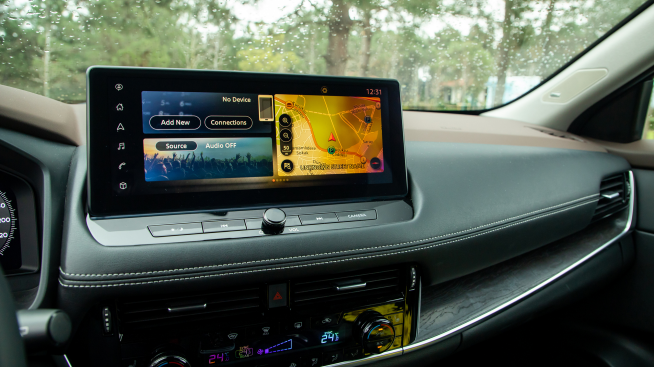Buyer beware: What is a rebuilt title?

When you’re shopping for a car, there are a number of options to choose from. You could buy it brand new, lease something or you could buy a car that’s been used. If searching for a used car, you may run into cars with rebuilt titles, whether on the lot or for private sale. But what is a rebuilt title, and why is it only for used cars? A car with a rebuilt title may look great and be priced below market but before you jump ahead, there are some things to be aware of.
What does a rebuilt title mean?
In order to understand what a rebuilt title is, let’s first learn just a little bit more about some of the other types of titles out there. A car title is a legal document indicating ownership of the vehicle. It usually provides other important information as well, such as the car’s make and model, vehicle identification number (VIN) and special statuses which you’ll learn about below.
Clear title
Cars with clear titles have never been involved in a serious accident, manufacturer recall, or odometer rollback. They are free of any distinctions that denote any kind of major problem or special status.
Salvage title
If a car has a salvage title, it's been in an accident serious enough to be totaled from an insurance perspective. That designation means the insurance company determined the cost of repairs would be greater than the car's total value, rendering it a total loss. This judgment is usually based on the insurance adjuster's estimate of the repair cost. Ultimately, a salvage title designation lets potential buyers know the car was seriously damaged at some point and may not be safe to drive.
Rebuilt title
A rebuilt title is what a salvage title can someday become, once a lot of work has been put into the totaled vehicle. Some mechanics may see a salvage title and try to restore the vehicle in order to sell it. Consequently, a rebuilt title indicates the totaled car was repaired and underwent inspection by a local or state motor vehicle agency.
Other title designations
While this article focuses on the three titles mentioned above, they’re not the only title designations out there. Other designations include export and import titles for overseas sales, junk titles for vehicles destined for the junkyard and affidavit or bonded titles for vehicles with a muddy ownership history, just to name a few. These title designations (and others) provide prospective buyers with vital information about the vehicle.
Pros and cons of rebuilt titles
Before buying a car with a rebuilt title, let’s take a deeper look at some of the pros and cons that come with them. Knowing these advantages and disadvantages may help you make a more informed choice.
Pro: May cost less
Cars with rebuilt titles have a major accident and extensive repairs in their history. This usually drives the price down quite a bit compared to a similar model with a clean title.
Con: Typically more difficult to insure
One reason vehicles with rebuilt titles are less expensive is that most insurance agencies may not insure them. If they do, you may have to pay high premiums. Most insurance companies have a pretty low tolerance for risk and rebuilt titles; by default, they can be risky as you’ll see below.
Pro: Extensive history
Cars with rebuilt titles may have extensive histories, available in online databases or by manually looking up the car’s VIN. Most rebuilt titles are required to provide documentation of all repairs and inspections, though these regulations vary by state.
Con: Documentation isn’t always reliable
Each state has its own laws around how rebuilt titles are documented. It may take extra caution to see if your state’s definition of “totaled” or “rebuilt” matches up to what you're comfortable with. These state-to-state inconsistencies sometimes also allow unscrupulous sellers to “wash” the title, making it appear clear when it isn’t.
Pro: It might not be so bad
As you now know, rebuilt titles usually require inspections and documentation before authorities let them back on the road. It’s a tedious process, so the hope is that anyone who went through it likely did so in good faith. There’s no way to guarantee that though, so it's good practice to get one or more trusted mechanics for a second, or even third, opinion before buying a car that’s been rebuilt.
Con: It might be worse than you thought
Despite being repaired and inspected, there may be a chance the vehicle’s damage wasn’t detectable in a standard inspection. Framework damage, in particular, may often go undetected and can be hard to repair.
A note on financing
Much like insurance, many lenders may not finance a vehicle with a rebuilt title due to the risk they carry. In the event that you do find a lender willing to take this on, your interest rate will probably be exorbitant. If you’re looking to purchase this kind of car, you’ll probably have to do so with cash.
How much does a rebuilt title devalue a car?
It’s hard to say exactly how much a rebuilt title devalues a car. It is undeniable, however, that they typically sell for less than a car with a clear title. Difficulties in obtaining insurance or financing can make cars with rebuilt titles hard to resell. Dealerships generally won't take them as trade-ins either. As such, cars with rebuilt titles will generally sell for less than vehicles with clear titles.
In summary
Now that you understand what a rebuilt title is, you can make a more informed choice on whether it’s right for you. It’s true that cars with rebuilt titles have technically been approved by local or state authorities, and that they usually sell at lower prices. Just be aware, however, that cars with rebuilt titles carry many inherent risks like unseen damage, and that most insurance companies and lenders may not insure or finance them for that reason.



